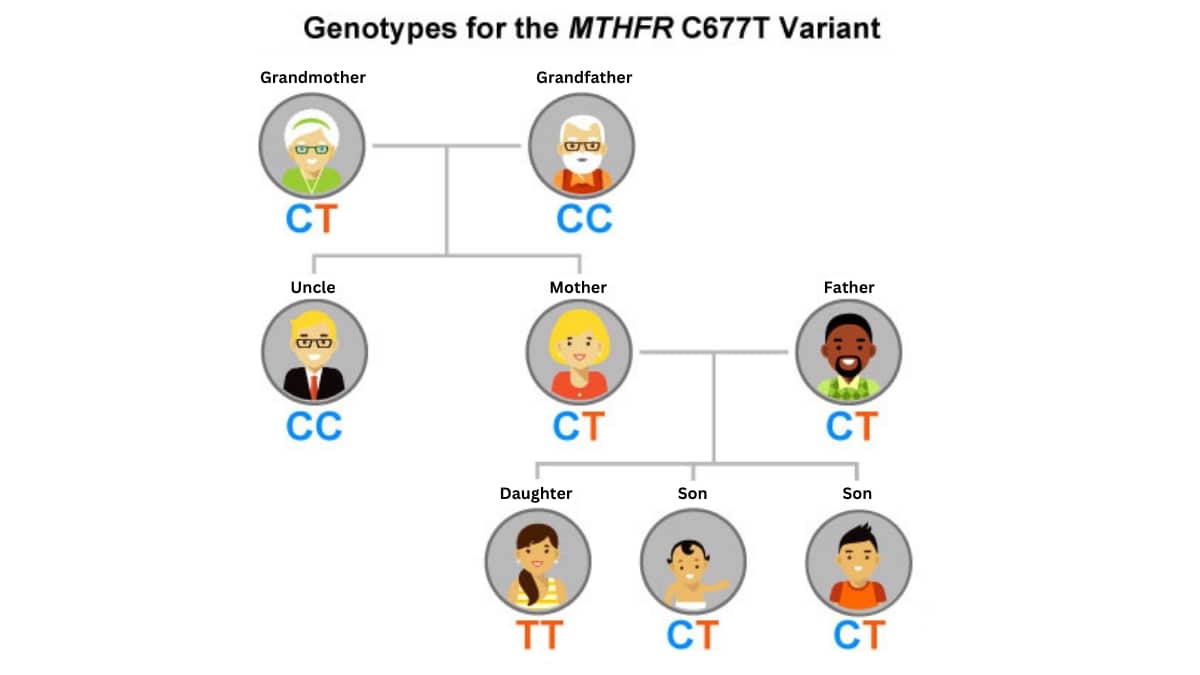Key points
- People with an MTHFR gene variant can process all types of folate, including folic acid.
- Getting 400 mcg of folic acid daily can help prevent neural tube defects (NTDs).
- Folic acid intake is more important for determining blood folate levels than having an MTHFR variant.

The basics
MTHFR gene: What is it?
The MTHFR gene provides instructions for your body to make the MTHFR protein. This protein helps your body process folate. Your body needs folate to make DNA and modify proteins.1
MTHFR gene variants
A gene variant is a change in a DNA sequence that is different from the expected DNA sequence. Variants in genes are what make us unique. They cause differences between people, such as eye color, hair color, and blood type.
Each person has two copies of the MTHFR gene. People get one from their mother and one from their father. The possible genotypes of the MTHFR 677 variants are shown in the image below. The most common variant in the MTHFR gene is called MTHFR C677T.2 This means that at the 677 position in the gene, the expected DNA base "C" is replaced by "T."3

Another common gene variant is the MTHFR A1298C variant. This gene variant occurs at the 1298 position in the MTHFR gene. This means at the 1298 position in the MTHFR gene, the expected DNA base "A" is replaced by "C."
There are other extremely rare MTHFR gene variants not discussed here. These gene variants may have significant effects on your health. If you have concerns about what having one of these extremely rare MTHFR gene variants means for your health care, talk to your doctor or a genetic counselor.
Populations
Gene variants are common and normal. In fact, more people in the United States have one or two copies of the MTHFR C677T variant than don't have it.4
Additionally, the MTHFR C677T variant is more common in some races and ethnicities than in others. Hispanic individuals are more likely than non-Hispanic Whites and non-Hispanic Blacks to have the MTHFR C677T variant.4
Impact on your body's ability to process folate
You may have heard that if you have an MTHFR variant, you should avoid folic acid and should take other types of folate, such as 5-MTHF. However, this is not true. People with an MTHFR gene variant can process all types of folate, including folic acid. Folic acid is the only type of folate shown to help prevent neural tube defects (NTDs).1
When getting the same amount of folic acid, people with the MTHFR 677 TT genotype have an average amount of folate in their blood that is only slightly lower (about 16% lower) than in people with the MTHFR CC genotype.5 Studies show that getting 400 mcg of folic acid daily can increase blood folate levels, regardless of your MTHFR genotype. Your folic acid intake is more important than your MTHFR genotype for determining the amount of folate in your blood.3567
There isn't enough evidence to show that the MTHFR A1298C variant alone significantly affects how the body processes folate.
Common MTHFR variants, such as MTHFR C677T, are not a reason to avoid folic acid.
What you can do
If you could become pregnant, you should get 400 mcg of folic acid daily, even if you have an MTHFR variant.
The two most important factors that determine whether you have enough folate in your blood to help prevent an NTD are
- The amount of folic acid you consume each day from fortified foods and vitamins/supplements containing folic acid.
- The length of time folic acid is consumed before becoming pregnant.2
Getting 400 mcg of folic acid each day helps prevent NTDs, even if you have an MTHFR variant. Taking folic acid at the recommended amounts has not been shown to cause harm. Getting more than the recommended amount of folic acid daily is not necessarily better for preventing an NTD. However, a doctor might recommend taking more than 400 mcg if you have other health conditions.
- Crider KS, Yang TP, Berry RJ, Bailey LB. Folate and DNA methylation: A review of molecular mechanisms and the evidence for folate's role. Adv Nutr. 2012;3(1):21-38.
- Online Mendelian Inheritance in Man, OMIM®. Johns Hopkins University, Baltimore, MD. MIM Number: 236250: 12/11/2014: https://omim.org/entry/236250#genotypePhenotypeCorrelations
- Wilcken B, Bamforth F, Li Z, et al. Geographical and ethnic variation of the 677C>T allele of 5,10 methylenetetrahydrofolate reductase (MTHFR): Findings from over 7000 newborns from 16 areas world wide. J Med Genet. 2003;40(8):619-625.
- Yang Q, Bailey L, Clarke R, et al. Prospective study of methylenetetrahydrofolate reductase (MTHFR) variant C677T and risk of all-cause and cardiovascular disease mortality among 6000 US adults. Am J Clin Nutr. 2012;95(5):1245-1253.
- Tsang BL, Devine OJ, Cordero AM, et al. Assessing the association between the methylenetetrahydrofolate reductase (MTHFR) 677C>T polymorphism and blood folate concentrations: a systematic review and meta-analysis of trials and observational studies. Am J Clin Nutr. 2015;101(6):1286-1294.
- Crider KS, Zhu JH, Hao L, et al. MTHFR 677C->T genotype is associated with folate and homocysteine concentrations in a large, population-based, double-blind trial of folic acid supplementation. Am J Clin Nutr. 2011;93(6):1365-1372.
- Crider KS, Devine O, Hao L, et al. Population red blood cell folate concentrations for prevention of neural tube defects: Bayesian model. BMJ. 2014;349:g4554.
- van der Put NMJ, Gabreëls F, Stevens EMB, et al. A second common mutation in the methylenetetrahydrofolate reductase gene: An additional risk factor for neural tube defects? Am J Hum Genet. 1998;62(5):1044-1051.
- Seyoum E, Selhub J. Properties of food folates determined by stability and susceptibility to intestinal pteroylpolyglutamate hydrolase action. J Nutr. 1998;128(11):1956-1960.
- Williams J, Mai CT, Mulinare J, et al. Updated estimates of neural tube defects prevented by mandatory folic acid fortification – United States, 1995-2011. MMWR Morb Mortal Wkly Rep. 2015;64(1):1-5.
